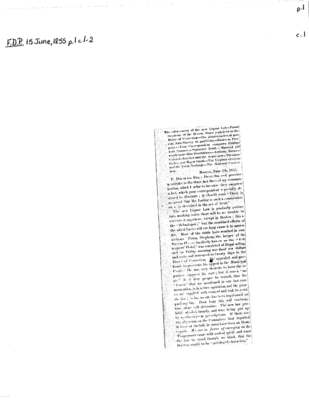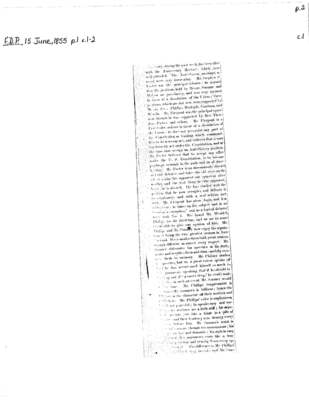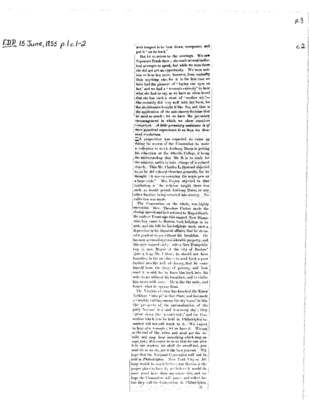Pages
D6800_Page_1
BOSTON, June 4th, 1855.
F. DOUGLASS, ESQ.: DEAR SIR:—I perceive a mistake in the three last lines of my communication, which I refer to because they suppress a fact, which your correspondent especially designed to illustrate; it should read "There is no proof that Mr. Loring is such a commissioner, as described in the act of 1850."
The new Liquor Law is gradually getting into working order, there will be no trouble to execute it anywhere, except in Boston; this is the "Sebastopol;" but the combined efforts of the allied forces will ere long cause it to surrender. Most of the trials have resulted in convictions. Paran Stephens, the keeper of the Revere House, familiarly know as the "Kidnappers' Hotel" was convicted of illegal selling, and on Friday morning was fined ten dollars and costs and sentenced to twenty days in the House of Correction. He appealed, and gave bonds to persecute his appeal in the Municipal Court. He was very desirous to have the reporters suppress his case; but it was a "no go." It is here proper to remark, that the league" that we mentioned in our last communication, is in active operation, and the poorest are supplied with counsel and bail, to resist the law; so far, no one has been imprisoned or paid any fine. How long this will continue, time, alone will determine. The new law prohibits alcohol, brandy, and wine being put up by apothecaries in prescriptions. If there was any physician on the Committee that reported in favor of the bill, he must have been an Homeopath. We are in favor of carrying on the Temperance cause with ardent spirit, and want the law to stand, though we think that the Doctors ought to be "privileged characters."
D6800_Page_2
The city during the past week, has been alive with the Anniversary Meetings, which were well attended. the Anti-Slavery meetings as usual, were very interesting. Mr. Stephen S. Foster was the principal debater; he argued that the position held by Messrs. Sumner and Wilson are pro-slavery, and was very earnest in favor of a dissolution of the Union; these positions, which are not new, were supported by Messrs. Foss, Phillips, Burleigh, Garrison, and Wright. Mr. Pierpont was the principal opponent, though he was supported by Rev. Theodore Parker and others. Mr. Pierpont is a Free Soiler and not in favor of a dissolution of the Union; he does not recognize any part of the Constitution as binding which commands men to do a wrong act, and believes that a man can honestly act under the Constitution, and at the same time occupy an Anti-Slavery position. Mr. Foster believes that to accept any office under the U.S. Constitution, is to become particeps criminis in the guilt and sin of slaveholding. Mr. Foster is an uncommonly shrewd and able debater, and takes the old stoic method of a king his opponent one question after another and the first thing he (the opponent) knows, he is floored. He has studied well the position that he now occupies, and defends it conscientiously and with a zeal seldom met with. Mr. Pierpont has more logic, and less enthusiasm; he takes up a subject and is as "cool as a cucumber," and as a logical debater must rank No 1. We heard Mr. Wendell Phillips for the third time, and we are to some extent able to give our opinion of him. Mr. Phillips and Mr. Sumner now enjoy the reputation of being the two greatest orators in New England. We consider them both great orators, though different in almost every respect. Mr. Sumner elaborates his speeches in his study, writes and rewrites them and then carefully commits them to memory. Mr. Phillips studies his speeches, but to a great extent speaks off hand, he has accustomed himself so much to extemporaneous speaking, that if he should be called up out of "a sweet sleep," he could make a speech; in such an event Mr. Sumner would ask for time. Mr. Phillips' temperament is sanguine—Mr. Sumner's is billious; hence the difference in the character of their motives and productions. Mr. Phillips' voice is euphonious, though not powerful; he speaks easy and earnestly; his gestures are a little stiff; his arguments go into you like a blaze in a pile of shavings, and their tendency is to destroy every bold and sonorous, though too monotonous; his gestures are free and dramatic; his style is easy and grand; his arguments come like a tempest, overpowering and bearing down every opposing element. The difference is, Mr. Phillips' fire is aimed to destroy an evil; and Mr. Sum-
D6800_Page_3
ner's tempest is to bear down, overpower, and put it "on its back."
But let us return to the meetings. We saw Sojourner Truth there; she made several ineffectual attempts to speak, but while we were there she did not get an opportunity. We were anxious to hear her, more, however, from curiosity than anything else, for it is the first time we have had the pleasure of "laying our eyes on her," and we had a "woman's curiosity" to hear what she had to say, as we have so often heard that she has such a store of "mother wit."— She certainly did very well with her book, for the abolitionists bought it like fun, and that is the application of the anti-slavery doctrine that we need so much; let us have the pecuniary encouragement in which we show ourselves competent. A little pecuniary assistance is of more practical importance to us than ten thousand resolutions.
A proposition was expected to come up during the session of the Convention to make a collection to assist Anthony Burns in getting his education at the Oberlin College, it being the understanding that Mr. B. is to study for the ministry, and is to take charge of a colored church. This Mr. Charles L. Remond objected to, as he did colored churches generally, for he thought "it was encouraging the negro pew on a large scale." Mr. Foster objected to that institution, as the religion taught there was such as would permit Anthony Burns, or any other fugitive, being returned into slavery. No collection was made.
The Convention, on the whole, was highly successful. Rev. Theodore Parker made the closing speech and in it referred to Mayor Smith. He said—"Years ago this ragged New Hampshire boy came to Boston, took lodgings in an attic, and the bill for his lodgings made such a depression in his financial affairs, that he deemed it prudent to go without his breakfast. He has now accumulated considerable property, and this once ragged and [illegible] New Hampshire boy is now Mayor of the city of Boston." Quite a leap, Mr. Editor; he should not have forgotten, in his greediness to send back a poor fugitive into the hell of slavery, that he came himself from the dregs of poverty, and how cruel it would be to force him back into his attic, to go without breakfast, and to clothe him again with rags. He is like the male, and forgets what he sprang from.
The Virginia election has knocked the Know Nothings "into pi" in that State, and has made a "mighty rattling among the dry bones" in this. The prospects of the nationalization of the party become less and less every day; they "grow down like a cow's tail;" and the Convention which is to be held in Philadelphia tomorrow will not add much to it. We expect to hear of a tornado; let us have it. We are at the end of the wires and shall get the details, and may hear something which may escape you; if it comes to us so that we can give it to our readers, we shall do so—if not, you must do as we do, get it the best you can. We hope that the National Convention will not be held in Philadelphia. New York City or Albany would be much better; but Boston is the proper place to have it; we believe it would do more good here than anywhere else, and we hope the Committee will pause and reflect before they call the Convention in Philadelphia.
S.


